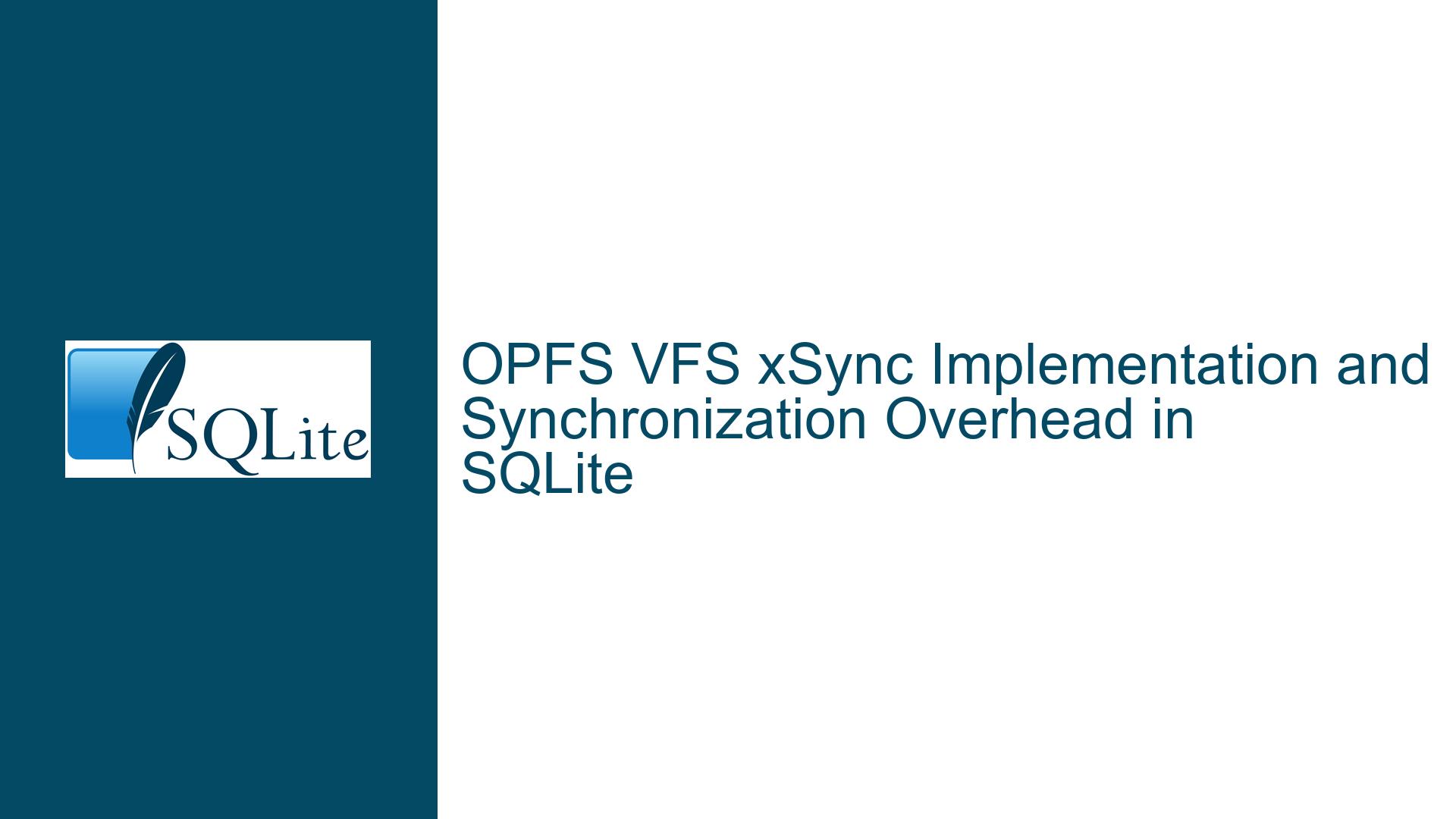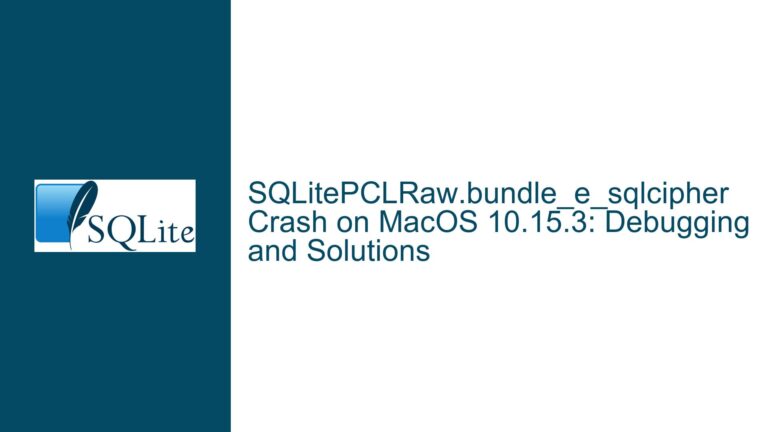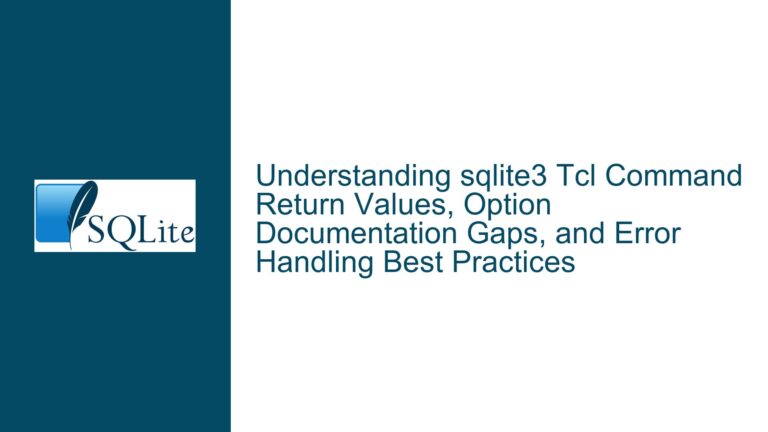OPFS VFS xSync Implementation and Synchronization Overhead in SQLite
Issue Overview: OPFS VFS Lacks Proper xSync Implementation and Incorrect Handling of SQLITE_FCNTL_SYNC
The core issue revolves around the implementation of the OPFS (Origin Private File System) Virtual File System (VFS) in SQLite, specifically its handling of file synchronization operations. The OPFS VFS was found to lack a proper implementation of the xSync method, which is critical for ensuring data integrity during write operations. Instead, it relied on the SQLITE_FCNTL_SYNC file control operation, which is only applied to database files and not to other critical files such as journal files. This oversight could lead to data corruption in the event of a crash, as journal files might not be fully written to storage before database changes are applied.
The problem was further compounded by the discovery that the OPFS VFS was syncing database files twice in succession—once via xSync and once via SQLITE_FCNTL_SYNC. This redundant synchronization, while safer than under-syncing, introduced unnecessary performance overhead, particularly in I/O-heavy operations. The issue was exacerbated by the fact that the VFS did not account for the PRAGMA synchronous=OFF setting, which should ideally disable all synchronization operations. The discussion also revealed that the SQLITE_FCNTL_SYNC handling was inherited from another VFS (kvvfs) without proper consideration of its applicability to OPFS, leading to a misalignment with SQLite’s documented behavior.
Possible Causes: Misaligned Synchronization Logic and Inherited Code Patterns
The root cause of the issue lies in the misalignment between the OPFS VFS’s synchronization logic and SQLite’s expected behavior. The OPFS VFS was initially developed based on a demo VFS, which may not have been designed with the same robustness requirements as a production-grade VFS. The reliance on SQLITE_FCNTL_SYNC for synchronization was a carryover from the kvvfs implementation, where it was necessary to ensure proper behavior even when PRAGMA synchronous=OFF was set. However, this approach was not appropriate for OPFS, as it led to redundant synchronization operations and did not fully address the need for syncing non-database files like journal files.
Another contributing factor was the lack of awareness of the SQLITE_FCNTL_PRAGMA file control operation, which could have been used to track the state of the PRAGMA synchronous setting. This oversight meant that the VFS could not conditionally disable synchronization operations when PRAGMA synchronous=OFF was set, leading to unnecessary performance overhead. The issue was further complicated by the fact that the OPFS VFS did not have direct access to the state of this pragma, making it difficult to implement a more nuanced synchronization strategy.
The performance impact of these issues was most pronounced in I/O-heavy workloads, particularly those involving large transactions. The redundant synchronization operations introduced a roughly 10% performance penalty in benchmarks, which could be significant in scenarios where write performance is critical. The issue was also more noticeable when using the --big-transactions flag, which was specifically added to address the performance characteristics of OPFS.
Troubleshooting Steps, Solutions & Fixes: Implementing xSync and Refining Synchronization Logic
The first step in addressing the issue was to implement the xSync method in the OPFS VFS. This ensured that all files, including journal files, were properly synchronized before changes were applied to the database. This change was critical for ensuring data integrity, particularly in the event of a crash. The implementation of xSync was tested and confirmed to work correctly, with debug output showing that multiple file handles were being synced as expected.
However, the implementation of xSync revealed a secondary issue: the redundant synchronization of database files via both xSync and SQLITE_FCNTL_SYNC. To address this, the VFS was modified to remove the handling of SQLITE_FCNTL_SYNC entirely. This change was based on the understanding that all synchronization operations should be unnecessary when PRAGMA synchronous=OFF is set, as the SQLite documentation explicitly states that no syncing should occur in this mode. The removal of SQLITE_FCNTL_SYNC handling was tested and found to have no adverse effects on data integrity, while also eliminating the performance overhead associated with redundant synchronization.
To further refine the synchronization logic, the VFS was updated to track the state of the PRAGMA synchronous setting using the SQLITE_FCNTL_PRAGMA file control operation. This allowed the VFS to conditionally disable synchronization operations when PRAGMA synchronous=OFF was set, aligning its behavior with SQLite’s documented expectations. This change not only improved performance but also ensured that the VFS behaved consistently with other SQLite VFS implementations.
The final step in resolving the issue was to conduct thorough performance testing to validate the changes. Benchmarks were run using the speedtest1 binary, which is specifically designed to stress-test I/O performance. The results showed that the removal of redundant synchronization operations and the conditional handling of PRAGMA synchronous=OFF led to a noticeable improvement in performance, particularly in I/O-heavy workloads. The benchmarks also confirmed that the changes had no negative impact on data integrity, ensuring that the VFS remained robust and reliable.
In conclusion, the issues with the OPFS VFS’s synchronization logic were resolved through a combination of implementing the xSync method, removing redundant synchronization operations, and refining the handling of the PRAGMA synchronous setting. These changes not only addressed the immediate concerns around data integrity and performance but also aligned the OPFS VFS more closely with SQLite’s expected behavior. The final implementation was tested extensively and confirmed to be both robust and efficient, making it suitable for use in production environments.






